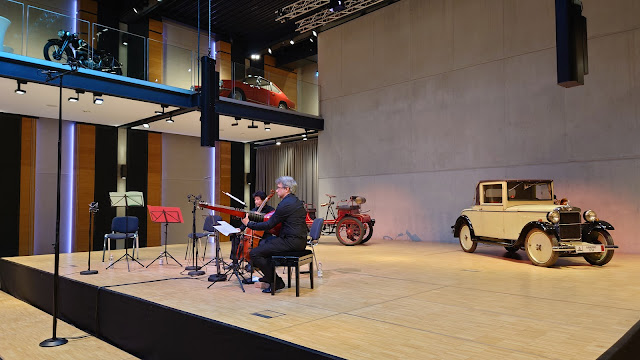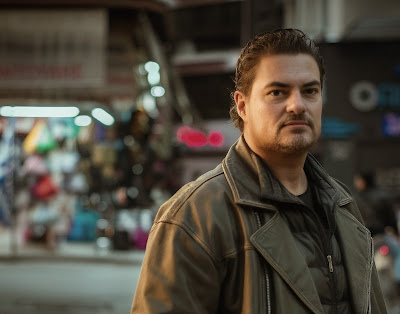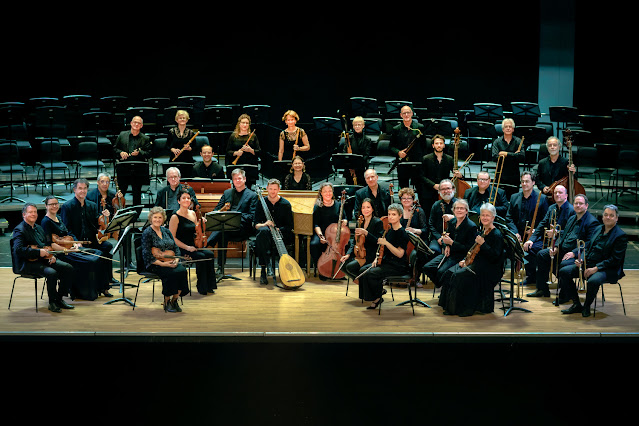 |
| Atsushi Sakai (viola da gamba) and Bruno Helstroffer (theorbo) at PS.Halle, Einbeck for the 2024 Internationale Händel Festspiele Göttingen |
This year’s Göttingen International Handel Festival takes place from 16 to 25 May 2025, once more under the artistic directorship of George Petrou, who has extended his contract as director until 2031. This year’s theme is fame and honour, power and glory, and the main events at the festival are a production of Handel’s Tamerlano, which will be performed in Göttingen and at the Elbphiharmonie in Hamburg, Handel’s oratorio Solomon and a gala concert with the mezzo-soprano Ann Hallenberg. Tamerlano features Lawrence Zazzo in the title role with Louise Kemény as Asteria, Juan Sancho as Bajazet, and Yuriy Mynenko as Andronico, whilst Solomon features Lena Sutor-Wernich in the title role and Francesca Lombardi Mazzulli in the three soprano roles plus James Way as Zadok.
 |
| George Petrou (Photo: FreddieF) |
But there is lots more Handel in the festival as well, and concerts showcasing what George Petrou refers to as their wonderful orchestra, the FestspielOrchester Göttingen. There is ensemble freymut in Couperin’s Les Nations, the Calmus Ensemble exploring both Byrd and birds, Mayumi Hirasaki, Christoph Dangel and Kristian Bezuidenhout in a chamber music tour of Italy, viol virtuoso Hille Perl and her period instrument ensemble Los Otros take us to the French court, Tra Noi give us music from those in the circle of Cardinal Ottoboni including of course George Frideric, but also Domenico Scarlatti, Arcangelo Corelli, Alessandro Scarlatti, Antonio Caldara and Antonio Vivaldi. The festival’s former artistic director, Nicholas McGegan returns to celebrate his 75th birthday and amongst the lunchtime concerts there is the chance to heard George Petrou displaying his keyboard skills. There is also the excitement of the eighth annual Göttingen Handel Competition which invites young ensembles from around the world to compete.
In addition to various venues in Göttingen, a number of events will also take place in the region of southern Lower Saxony, in Duderstadt, Friedland, Scheden, Einbeck, Herzberg am Harz and Hann. Münden, and we know from our experiences last year that many of these places are visually and historically engaging too.
The choice of works is partly the way things worked out and partly deliberate choice. Last year, the festival presented a modern pasticcio, Sarasine, as the main operatic work. The idea was to create a drama our of the various arias rejected by Handel which were never revised or recycled. This was something of a novelty, an experiment and this year George Petrou felt it would be good to go back to one of Handel’s major operas. For George, Tamerlano stands above everything that Handel did and its dramatic approach goes beyond the 18th century, looking forward to operatic developments in the 19th century. The big dramatic scene at the end of Act Three, when Bajazet dies on stage in front of the other protagonists, does not recur in Handel’s later operas, and both the dramatic approach and sound-world look forward to Romantic opera. For George, this is genius at its best, eternal and not restricted to one era. And for this years opera, not only are they returning to Handelian basics but presenting one of his crowning achievements.
Tamerlano has the most recitative of any of Handel’s operas, and in the throne room scene in Act Two, it has the longest sequence of recitative that Handel wrote. In his 2005 recording, George included all of Handel’s recitative, but the composer himself did abridgements. They intend to perform the full opera at the festival, with perhaps just a few cuts within arias but frankly George feels that there is nothing to cut. In this opera, everything serves a purpose, developing the drama further, though had admits that in other of Handel’s operas there are usually cuts possible.
Large-scale opera seria can remain a challenge for modern audiences (George’s recording has significantly over three hours of music), but he feels that an audience can follow the drama if the director does their job. The festival two previous Handel operas, Giuilio Cesare and Semele, were directed by George himself, since then he has invited colleagues who he has worked with before. Last year’s pasticcio was directed by Laurence Dale and this year Tamerlano will be directed by Rosetta Cucchi. Significantly, perhaps, both are musicians; Laurence Dale had a significant career as a tenor before moving into directing whilst Rosetta Cucchi, artistic director of the Wexford Festival, is an accompanist. Both bring a musician’s approach to the staging. For George, it is important to respect the music in any operatic staging. He points out that it is the composer who decides the timing, emotion and affekt in a scene via the music and we have to respect this. After all, if you don’t like it, you don’t have to do it, otherwise the director ends up getting involved in what is the composer’s job in a work.
He admits that such sympathetic stagings are not easy to do and require a lot of knowledge. He feels that some directors rely too much on instinct and that the dramaturgy of their productions comes from the libretto rather than the music. In Göttingen, as artistic director and conductor of the opera, George has a role to play in these decision, and this year he is working with something that he was worked with before as he and Rosetta Cucchi collaborated on a staging of Scarlatti’s Griselda (at the Festival della Valle d’Itria Martina Franca, and available on DVD), so he feels that Tamerlano is in good hands.
Handel’s Solomon is another amazing work and the topic, dealing as it does with a great king, is inspiring. But then he adds, what music of Handel’s is not great and he feels blessed to be part of the festival, adding that with Handel you can never go wrong. George comments that even the weakest of Handel’s operas is a masterpiece. Ann Hallenberg is, for George, one of the great ladies of Handel singing and with her approach to her Handel roles she has created a whole school of Handelian bel canto. The gala will feature arias by Handel to showcase her repertoire, and George has chosen concertos by Vivaldi as a contrast to these and to showcase the musicians in the best possible way.
 |
| FestspielOrchester Göttingen (Photo: Theodoro da Silva) |
The remainder of the events in the festival are intended to provide diversity and context, with a lot of the music relating to Handel to create a nice counterpoint to the three main festival events, and George takes great pride in the calibre of the artists they invite. The festival is not fixed but as the world involves, so does the festival and its events. George wants to include cutting edge Handel, whether new musicological discoveries or artistic goals. In the 1990s and 2000s, the focus was on historically informed performances, but George feels that now they can use the historically informed thinking that they learned to express something contemporary. Learning about authenticity was a process that is still going on. This is not the 18th century, we are different, we do not eat the same way nor do we laugh at the same things. What George wants to do is use these works of art to create modern culture through the thoughts of the past, to use their knowledge of these 18th century works to express today’s world.
With no recordings to refer to, we have to make an educated guess and we mostly comply within a set framework. But there are valuable questions to be asked. Is it important to make it sound like Handel expected, and would he like what we do? After all, the perception of speed in the 18th century is different to today whilst the sense of volume, of loudness, is very different, so that these things are not comparable.
Looking ahead, there are other pasticcos created by Handel himself, such as Giove in Argo, that represent a possibility as the festival opera. George feels that some years they can give themselves the luxury of being able to take a break and present something unknown or risky. And the wider repertoire at the festival does not always have to rely on Handel, there can be music that relates to Handel, finding links between Handel, his contemporaries and today. George’s quest is to approach three centuries of music from Handel through to today.
Full details from the festival’s website.
The blog is free, but I’d be delighted if you were to show your appreciation by buying me a coffee.
Elsewhere on this blog
- Another crazy day: Joe Hill-Gibbins’ production of Mozart’s The Marriage of Figaro returns to ENO reinvigorated – opera review
- My Heart’s in the Highlands: the debut recital from tenor Glen Cunningham mixes Stuart MacRae’s new songs with other composers with ‘Scotland in Mind’ – record review
- Unbearable intensity: musically strong revival of Janáček’s Jenůfa at the Royal Opera with incoming music director Jakub Hrůša on searing form in the pit – opera review
- Schubert’s Birthday at Wigmore Hall: Konstantin Krimmel in overwhelming form, with a welcome group of Carl Loewe too – concert review
- Bruckner’s obsession with death, Scottish Gaelic folk poetry & a grumpy gaboon: Scottish composer Jay Capperauld, Scottish Chamber Orchestra’s associate composer – interview
- Letter from Florida: a study in contrasts, Gounod’s Roméo et Juliette at Palm Beach Opera – opera review
- 1775 – A Retrospective: Ian Page & The Mozartists on terrific form in a deep dive into the sound-world of Mozart’s 1775 – concert review
- Canadian composer Jacques Hétu’s final symphony in a new recording with three of Canada’s major ensembles – record review
- Personal night time musings & reflections: Eight Nocturnes from violist & composer Katherine Potter commissioned by ABC Classic – cd review
- Reynaldo Hahn looks back: Belle Époque in Kaleidoscope Chamber Collective’s programme centred on Hahn’s Piano Quintet – concert review
- Home








